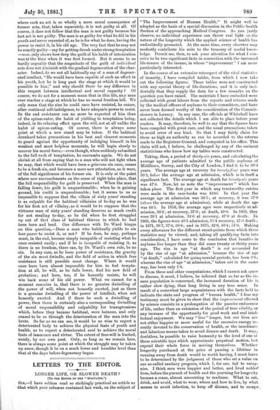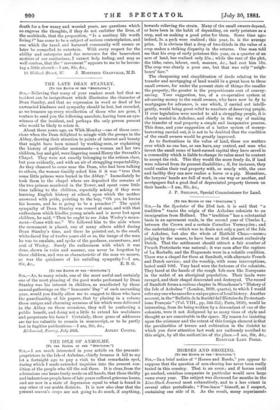LETTERS TO THE EDITOR.
LONGER LIFE, OR SLOWER DEATH?
(TO THE EDITOR OF THE SFECTATOR:i
have seldom read so strikingly practical an article as that which your columns contained last week, on the subject of "The Improvement of Human Health." It might well be adopted as the basis of a special discussion in the Public-health Section of the approaching Medical Congress. As you justly observe, no individual experience can throw real light on the nature of the longevity which the applied science of health has undoubtedly promoted. At the same time, every observer may modestly contribute his mite to the treasury of useful know- ledge. Permit me, then, to ask your attention for what I con- ceive to be two significant facts in connection with the increased life-tenure of the insane, in whose " improvement " I am more particularly interested.
In the course of an extensive retrospect of the vital statistics of insanity, I have compiled tables, from which 1 now take out the following figures. These tables were not constructed with any special theory of life-durations, and it is only inci- dentally that they supply the data for a few remarks on the question you have raised. The materials I have embodied were collected with great labour from the reports and returns made by the medical officers of asylums to their committees, and have never been deemed worthy of the consideration of the Commis- sioners in Lunacy. In any case, the officials at Whitehall have not collected the details which I am able to place before your readers. It may, therefore, be well to say that the figures have been compiled with great care, and the usual precautions taken to avoid error of any kind. So that I may fairly claim for them as high an authority as can be accorded to the returns made to the Registrar-General, and computed in his office. This claim will not, I believe, be challenged by any of the eminent statisticians who know how my tables were constructed.
Taking, then, a period of thirty-six years, and calculating the average age of patients admitted to the public asylums of Middlesex, Surrey, and the City of London, I find it to be 393 years. The average age at recovery for twenty-four years was 36-3, below the average age at admission, which is in itself a significant fact. The average age at death for twenty-six years was 47-6. Now, let us note the " improvement " which has taken place. The first year in which any trustwerthy entries were made in the case-books was 1810. In that year the average age at admission was 365; at recovery, it was 370 (above the average age at admission), while at death the age was 445. In 1856, the average ages were respectively at ad- mission, 382; at recovery, 370; at death, 490. In 1861, they were 391 at admission, 316 at recovery, 470 at death. In 1866, the figures were 401 admission, 354 recovery, 47.0 death ; in 1871, 387, 376, 506; and in 1875, 428, 404; 516. Making every allowance for the different stand-points from which these statistics may be viewed, and, taking all qualifying facts into consideration, I have come to the conclusion that lunatics in asylums live longer than they did some twenty or thirty years ago. The rise in age "at death" is not accounted for by the rise of age "at admission," because the rise of age "at death," calculated for quinq uennial periods, has been 38; whereas the rise of age "at admission," taken out in the same way, has been only 16.
Frcm these and other computations, which I cannot ask. space to discuss, it must, I believe, be inferred that so far as the in- sane population is concerned, the increased duration of life is rather slow dying, than long living in any true sense. In result of a somewhat large acquaintance with the facts held to indicate the state and progress of "human health," I fear my testimony must be given to show that the improvement effected by science consists in a prolongation of the passive endurance of life, rather than an extension of the period of true vitality, or any increase of the opportunity for good work and real intel- lectual enjoyment. We may " live " longer, but our lives are not either happier or more useful for the excessive energy re- cently devoted to the conservation of health, or the inordinate and laborious means taken to avoid disease and death. It may, doubtless, be possible to raise humanity to the level of one of those scientific toys which approximate perpetual motion, but expend their whole force in moving themselves. Whether longevity purchased at the price of passing a lifetime in running away from death would be worth having, I must leave to be determined by the judgment of those who set a value on our so-called sanitary progress, which I, for one, fail to recog- nise. I think men were happier and better, and lived nobler\ lives, before the pursuit of health and the yearning for longevity became a craze, almost amounting to madness. What to eat, drink, and avoid, what to wear, where and how to live, by what means to avoid infection, to keep off disease, and to escape ) death for a few weary and worried years, are questions which so engross the thoughts, if they do not embitter the lives, of the multitude, that the proposition, "Is a sanitary life worth living ?" has come to be a subject of serious contemplation, and one which the taxed and harassed community will sooner or later be compelled to entertain. With every respect for the ability and enterprise and due reverence for the benevolent motives of our sanitarians, I cannot help feeling, and may as well confess, that the "movement" appears to me to be becom- ing a little absurd.—I am, Sir, &c., 18 Weikel.. Street, IV. J. MORTIMER GRANVILLE, M.D.



































 Previous page
Previous page